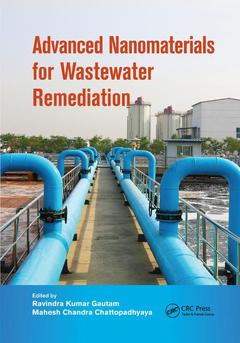Advanced Nanomaterials for Wastewater Remediation Advances in Water and Wastewater Transport and Treatment Series
Coordonnateurs : Gautam Ravindra Kumar, Chattopadhyaya Mahesh Chandra

Contamination of aqueous environments by hazardous chemical compounds is the direct cause of the decline of safe clean water supply throughout the globe. The use of unconventional water sources such as treated wastewater will be a new norm. Emerging nanotechnological innovations have great potential for wastewater remediation processes. Applications that use smart nanomaterials of inorganic and organic origin improve treatment efficiency and lower energy requirements. This book describes the synthesis, fabrication, and application of advanced nanomaterials in water treatment processes; their adsorption, transformation into low toxic forms, or degradation phenomena, and the adsorption and separation of hazardous dyes, organic pollutants, heavy metals and metalloids from aqueous solutions. It explains the use of different categories of nanomaterials for various pollutants and enhances understanding of nanotechnology-based water remediation to make it less toxic and reusable.
Nanomaterials Applications for Environmental Remediation. Treatment of Fluoride-Contaminated Water by Electrocoagulation Followed by Microfiltration Technique. Electrooxidation Processes for Dye Degradation and Colored Wastewater Treatment. Advanced Oxidation Processes Using Nanomaterials. Applications of Synthetic Nanocomposite Ion-Exchange Materials as Chemical and Vapor Sensors. Nanomaterial-Supported Biopolymers for Water Purification. Nanomaterial-Based Sorbents for the Removal of Heavy Metal Ions from Water. Synthesis, Properties, and Applications of Carbon Nanotubes in Water and Wastewater Treatment. Carbon- and Graphene-Based Nanocomposites for Wastewater Treatment. Nanoscale Layered Double Hydroxides for Wastewater Remediation: Recent Advances and Perspectives. Activated Carbon-Doped Magnetic Nanoparticles for Wastewater Treatment. Functionalized Fe3O4 Nanoparticles for the Removal and Remediation of Heavy Metals in Wastewater. Nanoscale Materials for the Removal of Arsenic from Wastewater. Metal Organic Framework-Based Adsorbents in Water Treatment. Environmental Fate and Ecotoxicity of Engineered Nanoparticles: Current Trends and Future Perspective.
Ravindra Kumar Gautam is engaged in doctoral work in the Department of Chemistry, University of Allahabad, India. His areas of interests are adsorption and nanomaterials, and their analogues for water/wastewater remediation. He has published over 60 research papers and has written a book entitled, "Environmental Magnetism: Fundamentals and Applications" published by Lambert Academic Publishing. He is a Fellow of the Indian Chemical Society and Life Member of the Indian Science Congress Association. He is a member of the editorial boards of International Journal of Nanoscience and Nanoengineering, American Journal of Environmental Engineering and Science, and International Journal of Environmental Monitoring and Protection.
Mahesh Chandra Chattopadhyaya is Professor in Department of Chemistry, University of Allahabad, India since 1974. He served as head of the Department of Chemistry during the period 2008-2010. He teaches Inorganic and Analytical Chemistry and Environmental Chemistry. He was elected as Fellow of Cambridge Philosophical Society, Fellow of Chemical Society, London, Indian Chemical Society, Institution of Chemists, India. He was President of the Indian Chemical Society during the years 2011-2013. He has published over 150 research papers in different national and international journals. Twenty eight research scholars have been awarded doctoral degree under his supervision. Currently, he is working on the nanomaterials and nanocomposites, and their application for environmental remediation, solid oxide fuel cells, and synthesis of inorganic materials and development of sensors for estimation of surfactants.
Date de parution : 12-2019
17.8x25.4 cm
Date de parution : 07-2016
17.8x25.4 cm
Thèmes d’Advanced Nanomaterials for Wastewater Remediation :
Mots-clés :
Adsorption Capacity; Ar Bo; Carbon- and Graphene-Based Nanocomposites; EF Process; Heavy Metals in Wastewater; Magnetic Nanoparticles; Electrocoagulation; Maximum Adsorption Capacity; Fluoride-Contaminated Water; MOFs; Environmental Remediation; Si Te; Ecotoxicity; Fluoride Removal; Engineered Nanoparticles; American Chemical Society; Nanotechnology; Calcine LDH; Nanoscale Materials; Initial Fluoride Concentration; Reactive Black 5; Nanotubes; Anodic Oxidation; Heavy Metal Removal; Ox Id; Activated Carbon; Heavy Metal Ions; ENPs; Fe3O4 Nanoparticles; BDD Anode; Ri De; Photocatalytic Degradation; CuO NPs; Mesoporous MOFs


